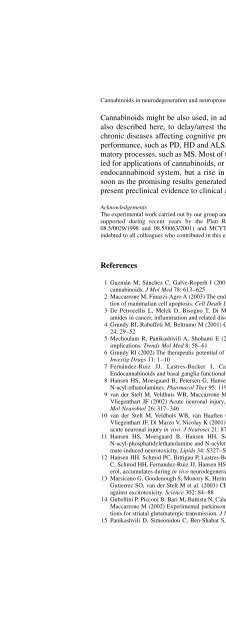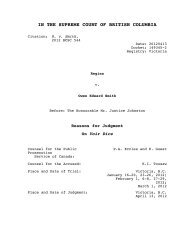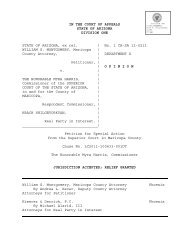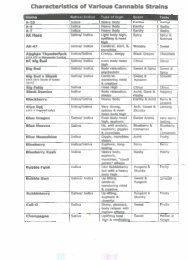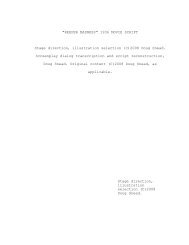3. Umbruch 4.4..2005 - Online Pot
3. Umbruch 4.4..2005 - Online Pot
3. Umbruch 4.4..2005 - Online Pot
You also want an ePaper? Increase the reach of your titles
YUMPU automatically turns print PDFs into web optimized ePapers that Google loves.
Cannabinoids in neurodegeneration and neuroprotection 101<br />
Cannabinoids might be also used, in addition to several symptomatic utilities<br />
also described here, to delay/arrest the progression of neurodegeneration in<br />
chronic diseases affecting cognitive processes, such as AD, motor control or<br />
performance, such as PD, HD and ALS, or those initially produced by inflammatory<br />
processes, such as MS. Most of these diseases have scarcely been studied<br />
for applications of cannabinoids, or for changes in specific elements of the<br />
endocannabinoid system, but a rise in the number of studies is expected as<br />
soon as the promising results generated by these molecules progress from the<br />
present preclinical evidence to clinical applications.<br />
Acknowledgements<br />
The experimental work carried out by our group and that has been mentioned in this chapter has been<br />
supported during recent years by the Plan Regional de Investigación – CAM (grant nos<br />
08.5/0029/1998 and 08.5/0063/2001) and MCYT (grant no. SAF2003–08269). The authors are<br />
indebted to all colleagues who contributed in this experimental work.<br />
References<br />
1 Guzmán M, Sánchez C, Galve-Roperh I (2001) Control of the cell survival/death decision by<br />
cannabinoids. J Mol Med 78: 613–625<br />
2 Maccarrone M, Finazzi-Agro A (2003) The endocannabinoid system, anandamide and the regulation<br />
of mammalian cell apoptosis. Cell Death Differ 10: 946–955<br />
3 De Petrocellis L, Melck D, Bisogno T, Di Marzo V (2000) Endocannabinoids and fatty acid<br />
amides in cancer, inflammation and related disorders. Chem Phys Lipids 108: 191–209<br />
4 Grundy RI, Rabuffeti M, Beltramo M (2001) Cannabinoids and neuroprotection. Mol Neurobiol<br />
24: 29–52<br />
5 Mechoulam R, Panikashivili A, Shohami E (2002) Cannabinoids and brain injury: therapeutic<br />
implications. Trends Mol Med 8: 58–61<br />
6 Grundy RI (2002) The therapeutic potential of the cannabinoids in neuroprotection. Expert Opin<br />
Investig Drugs 11: 1–10<br />
7 Fernández-Ruiz JJ, Lastres-Becker I, Cabranes A, González S, Ramos JA (2002)<br />
Endocannabinoids and basal ganglia functionality. Prost Leukot Essent Fatty Acids 66: 263–273<br />
8 Hansen HS, Moesgaard B, Petersen G, Hansen HH (2002) Putative neuroprotective actions of<br />
N-acyl-ethanolamines. Pharmacol Ther 95: 119–126<br />
9 van der Stelt M, Veldhuis WB, Maccarrone M, Bar PR, Nicolay K, Veldink GA, Di Marzo V,<br />
Vliegenthart JF (2002) Acute neuronal injury, excitotoxicity, and the endocannabinoid system.<br />
Mol Neurobiol 26: 317–346<br />
10 van der Stelt M, Veldhuis WB, van Haaften GW, Fezza F, Bisogno T, Bär PR, Veldink GA,<br />
Vliegenthart JF, Di Marzo V, Nicolay K (2001) Exogenous anandamide protects rat brain against<br />
acute neuronal injury in vivo. J Neurosci 21: 8765–8771<br />
11 Hansen HS, Moesgaard B, Hansen HH, Schousboe A, Petersen G (1999) Formation of<br />
N-acyl-phosphatidylethanolamine and N-acylethanolamine (including anandamide) during glutamate-induced<br />
neurotoxicity. Lipids 34: S327–S330<br />
12 Hansen HH, Schmid PC, Bittigau P, Lastres-Becker I, Berrendero F, Manzanares J, Ikonomidou<br />
C, Schmid HH, Fernandez-Ruiz JJ, Hansen HS (2001) Anandamide, but not 2-arachidonoylglycerol,<br />
accumulates during in vivo neurodegeneration. J Neurochem 78: 1415–1427<br />
13 Marsicano G, Goodenough S, Monory K, Hermann H, Eder M, Cannich A, Azad SC, Cascio MG,<br />
Gutierrez SO, van der Stelt M et al. (2003) CB1 cannabinoid receptors and on-demand defense<br />
against excitotoxicity. Science 302: 84–88<br />
14 Gubellini P, Picconi B, Bari M, Battista N, Calabresi P, Centonze D, Bernardi G, Finazzi-Agrò A,<br />
Maccarrone M (2002) Experimental parkinsonism alters endocannabinoid degradation: implications<br />
for striatal glutamatergic transmission. J Neurosci 22: 6900–6907<br />
15 Panikashvili D, Simeonidou C, Ben-Shabat S, Hanusˇ L, Breuer A, Mechoulam R, Shohami E


